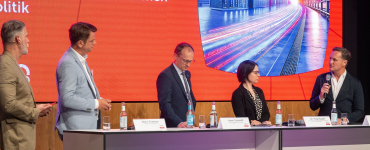At the Internet Policy Forum on 26 April in Berlin, we will discuss how the ‘digital policy awakening’ can succeed with the German Federal Minister of Education Bettina Stark-Watzinger, SPD Chair Saskia Esken, Dr Markus Richter, State Secretary at the German Federal Ministry of the Interior and CIO Bund, as well as other high-ranking representatives from politics, business and science. In an interview, eco Chair Oliver Süme talks in advance about top digital policy issues and how digitalisation helps to overcome global crises. You can register for the (German-language) hybrid event in Berlin, which is supported by Huawei, Leaseweb and the Vodafone Institute, here.
The traffic light coalition has set itself the goal of a ‘digital awakening’. In your opinion, which points are at the top of the digital policy to-do list?
The German federal government has a lot of catching up to do in this legislative period. Be it the expansion of digital infrastructure, progress in establishing a digital administration or in the area of digital education. We have formulated all of these in our 20 core demands to the German federal government.
At the top, however, is probably the desire for a consistent digital strategy that draws the broad lines of digital policy for the coming years and whose implementation is pursued across all ministries. Secondly, the topics of digitalisation and sustainability must be thought of more strongly together. After all, digital technologies and applications offer enormous potential for achieving Germany’s and the EU’s climate goals. Thirdly, the issue of security is very close to my heart. For trustworthy and robust IT security, we need transparent, reliable rules and the use of encryption technologies. Since the Russian war of aggression on Ukraine, this topic has certainly become even more explosive.
What means does digitalisation offer in global crises like the Ukraine war, and where should the German federal government start now?
The importance of digital technologies and applications for the economy and society already became more than clear during the Covid-19 pandemic. The war in Ukraine shows even more drastically that free access to the Internet is the key to information and communication. Currently, the Internet not only serves as an important mouthpiece for the people of Ukraine but is also elementary in countries with repressive regimes that want to restrict and control access to information.
But the Russian war of aggression is not least an attack on the free, open Internet. The German federal government should therefore also place a clear focus on strengthening general IT security, dealing with disinformation campaigns according to the rule of law and approaches to digital sovereignty. First and foremost, this requires well-developed gigabit networks and reliable digital infrastructures as well as powerful and secure data centres as the foundation for secure data traffic. Incidentally, waste heat from data centres in Germany is currently also being discussed as an alternative to Russian gas. For this to become reality, however, the necessary political framework conditions and a close exchange between politics and the Internet industry are needed.
What would you like to see in cooperation with the German federal government, ministries and parliament in the coming years?
In general, I would like to see a broader and more intensive political discourse on digital policy issues. Precisely because it is a cross-cutting issue that affects many different areas and actors. This also means that politics should seek greater exchange with business, science and civil society and use them more frequently. I also think it is important that consultation processes remain realistic and practicable and that the German federal government makes consistent political decisions.




